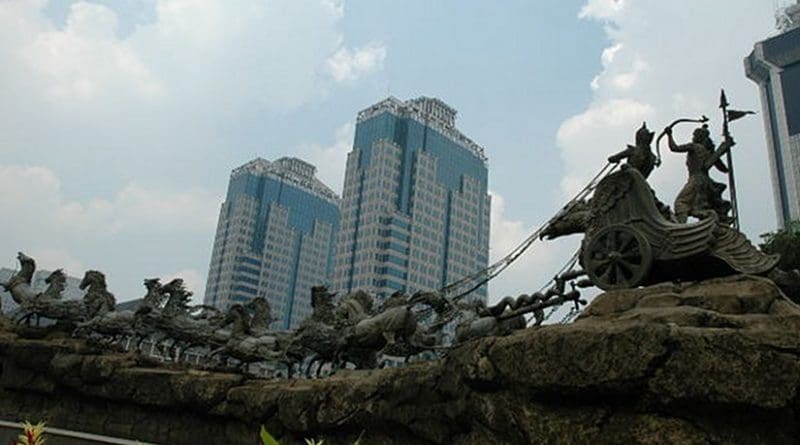Chinese Legacies In Indonesia: Strengthening Xi Jinping Policies? – OpEd
Until 2022, China’s footprints in Indonesia have spread not only in politics and economy but also in culture. Jakarta and Beijing have had a close relationship since Indonesian President Joko “Jokowi” Widodo was elected in 2014. In this case, in 2021, the total trade between Jakarta and Beijing reached US$85,4 billion compared to US$ 78,7 billion in 2020. Consequently, China has become one of Indonesia’s main trading partners.
For historical background, China existed in Indonesia, later named Nusantara, for trading. The Chinese traders came to Indonesia to have a transaction with pribumi to fulfill their needs. They also spread within married pribumi, and thus, they integrated with the locals. Not only that, some analysts have predicted that the Chinese used their food to express their culture.
In 2015, Lertchavalitsakul conducted research about phenomena. He found that food can integrate a migrant and local society, which also can be seen as a form of cultural and ethnic identification.
Chinese food has divided into eight categories based on their province of origin in China, namely Shandong dishes, Hunan dishes, Guangdong or Kwangtung or Kanton dishes, Fujian or Hokkien dishes (the source of the most Chinese in Indonesia), Zhejiang dishes, Jiangsu dishes, Anhui dishes, and Sichuan dishes.
Those cuisines have been promoted by Chinese Peranakan and Chinese Totok, who have integrated with their society. Those ethnicities have a different ways to cook Chinese dishes with Indonesian dishes. Peranakan, for example, usually combine their food with the local food (use coconut milk and local spices, such as turmeric) that produce Chinese food with local flavor. Besides, Totok usually cooks using traditional herbs, such as Chinese five flavors and stir-fried vegetables.
However, somehow, the Peranakan style of cooking can be easily found in Indonesian daily meals, such as nasi goreng (fried rice), mi Goreng (fried noodle), bihun goreng (fried vermicelli), kwetiau (fried rice strip), lumpia (spring roll), siomay (steamed fish cake) and bakpia (sweet roll filled with mung beans). The spreading of Chinese also can be found in Jakarta, the capital of Indonesia. Chinese foods have also influenced the Betawi dishes, such as asinan (pickled vegetables and fruits) and rujak juhi (vegetable salad with salted cuttlefish).
Some Indonesians think that fried rice is their culture instead of originating from China.
Nowadays, with the Chinese traders’ legacies, China, with its current policy, has expanded its culture through the existence of five Confucius Institutes since the first one existed in 2007. CI can be found in parts of cities in Indonesia, for instance, Jakarta, Malang, and Makassar. Jakarta and Beijing provided various programs within those institutes, likely learning Mandarin, a scholarship, and an exchange program.
Amorisa Wiratri, a researcher at the Indonesia Institutes of Sciences (LIPI) from her study, argued Chinese foods are soft diplomacy in Indonesia. Theoretically, Wiratri’s idea aligns with an American Scholar, Joseph Nye, who created soft power theory. He argued that the approach would emphasize the country’s power that was used for persuasion to fulfill its national interest.
The existence of Chinese culture tends to be a vehicle for the Xi government. President Xi always assumes that Indonesia is one of China’s ‘neighborhoods’. Indonesia was a second reason why President Xi introduced the Belt and Road Initiative program and talked about the Asian Infrastructure Investment Bank proposal in Bali.
The high rail-way speed connected Jakarta and Bandung is also Belt and Road’s mega project. In its development, this project had a material restrictions due to Covid-19. However, Jokowi announced this project would continue.
On the other hand, Indonesia brought the Chinese as its partner to tackle the toll of Covid-19 by purchasing Chinese vaccines, likely Sinovac. Despite the third wave of Covid-19, the Chinese government proposed Indonesia as a vital vaccine market in Southeast Asia.
What is concerning in this article is that Chinese acceleration will increase in the coming years. Despite all of Anti-Sentiment China in Indonesia, Beijing will use its legacy to strengthen its position.
*M Habib Pashya, an International Relations student at Universitas Islam Indonesia and a Researcher at Center of Indonesia-China Studies

